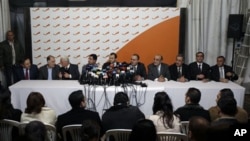Two days after the Lebanese government collapsed, Lebanese political parties remain locked in opposition over the international court investigating the assassination of Prime Minister Rafik Hariri.
When 11 ministers resigned on Wednesday, the government of Prime Minister Sa’ad Hariri dissolved. Now, as parties get ready to select a new candidate for the post, political gridlock appears to be absolute.
The goal: to select a prime minster and that can form a new Lebanese government. The problem: deep divisions over the Special Tribunal for Lebanon (STL) , the U.N.-backed court investigating the 2005 assassination.
On one side is the party of Sa’ad Hariri and his allies, the Western-backed ruling party known as the March 14 alliance. They support the international tribunal. Fares Souaid, the March 14 secretary general says as the his coalition’s position is clear. "We are going to support Sa’ad Hariri as the Prime Minister and we are going to confirm our support for the international tribunal," he said.
On the other side is the March 8 alliance, the opposition coalition that includes Hezbollah, a political party and Shi’ite militant group, which has the strongest military force in Lebanon and is backed by Iran and Syria. Ten of the 11 ministers that quit the government Wednesday were from Hezbollah.
Hezbollah members are expected to be indicted by the court in connection with the assassination in the coming weeks. The organization has repeatedly blasted the court and called on the Lebanese people to refuse to cooperate with investigators. March 8 contends that the tribunal, which has strong support from the U.S., is not seeking justice. They say the court is a Western political tool seeking only to discredit Hezbollah, a U.S. designated terrorist organization.
Alain Aoun is a Member of Parliament and of the Free Patriotic Movement, a powerful mostly-Christian party in the March 8 alliance. He says the opposition will never accept a prime minister that supports the tribunal. The tribunal, he says, is too politicized to deliver a fair verdict. "Lots of Lebanese people today don’t see anymore the STL as a path to justice and to truth, they see it as more of a political tool in a game of nations," he said.
Diplomatic efforts by Saudi Arabia and Syria to diffuse the situation have failed. And on Monday, the parliament will meet to begin negotiations. Both parties say the only way a consensus can be reached is if the other backs down. March 14 says Sa’ad Hariri must be reinstated as prime minister. March 8 says he must not.
And while the parties fight, the government, which has been almost entirely inactive for months, continues not to operate.
The one thing the parties do agree on is that as long as there is political instability in Lebanon, the risk of that instability moving onto the streets is great. On Thursday two grenades were reportedly thrown into an office of the Free Patriotic Movement.
Lebanon has a long history of sectarian violence, civil war and political assassinations. For March 14, the fear is that if an agreement is not reached, Hezbollah will use weapons to force their party to acquiesce. In 2008, the organization took over much of West Beirut in a matter of days, forcing the government to make structural changes in its favor.
Butros Harb, the Minister of Labor under Sa’ad Hariri, says, for now, he does not think it would benefit Hezbollah to try to take over again. "They know it would be a huge mistake. It would blow up chances of co-existence between the people in the country. It will create a new situation in the country that will not be in the benefit of Hezbollah. People will not be tolerating or accepting that it happens again, and I think they will react," he said.
Harb says the worst-case scenario is that no agreement is reached. If this comes, he says, not only will the government be collapsed, but the entire governmental system will fall apart.
Before the debates begin Monday, Hezbollah leader Hassan Nasrallah is expected to speak publicly. And while Lebanon waits for an answer, fears that tension could turn to violence continue to linger.
Lebanon Political Parties Gridlocked





